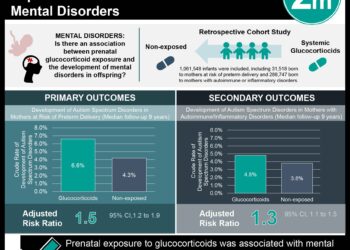Pregnant patients with epilepsy may benefit from increased doses of anticonvulsant medications
1. In this observational cohort study, women with epilepsy experienced significant decreases in serum levels of their prescribed anticonvulsant medications during pregnancy when routinely monitored.
2. Patients may benefit from increased anticonvulsant doses during pregnancy in order to optimize seizure control.
Evidence rating level: 2 (Good)
Study Rundown: Management of epilepsy during pregnancy is complicated by the known teratogenicity as well as the complex pharmacological properties of many anticonvulsant medications. Strategies to protect mother and fetus from the harm of seizures must be balanced with potential toxicities of treatment. This prospective cohort study was conducted based on the hypothesis that strategic monitoring of serum anticonvulsant levels during pregnancy may increase the potential benefits of medical therapy while remaining mindful of the risks. A prospective cohort derived from the Maternal Outcomes and Neonatal Effects of Antiepileptic Drugs (MONEAD) study followed a total of 460 patients (351 pregnant women and 109 control subjects). Patients were taking one of the following anti seizure medications (ASMs) either alone or in polytherapy (28.8% pregnant, 26.0% nonpregnant): lamotrigine, levetiracetam, lacosamide, oxcarbazepine, carbamazepine and zonisamide. Lamotrigine and levetiracetam were the most commonly used ASMs in both cohorts. The median total daily dose of ASMs was higher at baseline in the pregnant cohort compared to the controls, and compared to the postpartum period. Analysis of dose-adjusted concentrations found that significantly less ASM was present in the serum of women during pregnancy compared to non-pregnant states for all medications except for carbamazepine. In addition, lamotrigine was found to have significant differences in serum concentrations between trimesters whereas the other study medications were not. Pennell et al concluded that the dose-adjusted concentrations of various ASMs were lower in the serum of women during pregnancy compared to the postpartum period and nonpregnant controls. These findings have implications for drug dosing during pregnancy, such that higher doses may be needed to prevent seizure activity as the pharmacokinetics are altered in the pregnant state. Some strengths of this study include the strong theoretical basis upon which it was designed (that is, known alterations to drug mechanics which occur during pregnancy) as well as the thoroughness of the analysis. Limitations include the small sample size and the nonrandomized nature of the study which make it difficult to control for possible confounding factors.
Click here to read this study in JAMA Neurology
Relevant Reading: Pregnancy and the control of epileptic seizures: a review
In-Depth [prospective cohort study]: Data for this analysis were obtained from the repository of MONEAD, a prospective cohort study conducted at several American sites. Women aged 14-45 years with epilepsy who were able to keep a daily medical diary were included. Patients were excluded if they had: an intellectual disability, progressive cerebral disease or other serious comorbidities, exposure to non-antiepileptic teratogens or a personal or family history of genetic disorders. This study required patients to attend a total of seven visits spaced throughout their antenatal care, delivery and up to 9 months after delivery. Data collection involved a daily medical diary, blood samples drawn at each study visit and a thorough medical history. Liquid chromatography-mass spectrometry assays were used to determine plasma concentrations of antiseizure medications. The median daily dose of lamotrigine (range) during the second trimester of pregnancy was 500mg (50-190) compared with 400mg (50-100) in the postpartum period and 400mg (100-800) in the control group. Dose-adjusted concentrations of ASMs were lower during all of pregnancy compared with nonpregnant patients, with median differences as follows for lamotrigine: -5.47ug/L/mg during the first trimester, -7.63ug/L/mg during the second and -7.67ug/L/mg during the third. Overall, concentrations of lamotrigine decreased up to 56.1% during pregnancy. Maximum decreases in dose-adjusted concentrations were as follows for other ACMs: 36.8% for levetiracetam (11.33 to 7.16 μg/L/mg; P < .001), 17.3% for carbamazepine (11.56 to 7.97 μg/L/mg; P = .03), 32.6% for oxcarbazepine (11.55 to 7.79 μg/L/mg; P < .001), 30.6% for unbound oxcarbazepine (6.15 to 4.27 μg/L/mg; P < .001), 39.9% for lacosamide (26.14 to 15.71 μg/L/mg; P < .001), and 29.8% for zonisamide (40.12 to 28.15 μg/L/mg; P < .001).
Image: PD
©2022 2 Minute Medicine, Inc. All rights reserved. No works may be reproduced without expressed written consent from 2 Minute Medicine, Inc. Inquire about licensing here. No article should be construed as medical advice and is not intended as such by the authors or by 2 Minute Medicine, Inc.







